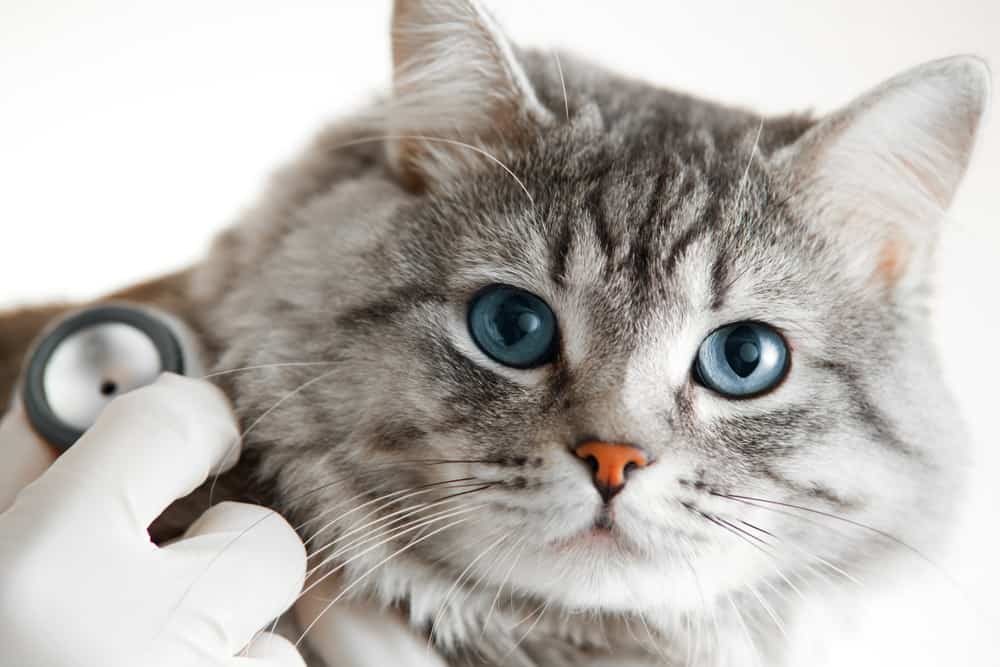But Doc, Are All These Tests Necessary? Explaining the Importance of Routine Care

No one likes visiting the doctor. Adding a needle poke to your pet during her annual wellness exam may seem rough, but it can provide a lot of useful information to your veterinarian. That needle prick can be used to draw a blood sample to obtain baseline blood work on your pet, and it could help us to identify any disease processes we’re not able to see during the physical exam.
In addition to annual blood work, we may recommend a urinalysis and a fecal test so we can keep tabs on your furry friend’s kidney function, bladder health, and the presence of any parasites. Remember, our pets age much more quickly than we do, so an annual checkup is crucial to identifying diseases early and preventing them from progressing.
Annual blood work
Blood work gives us a great picture of what is going on inside your pet, letting us know how the organs are functioning or if there’s any sign of anemia or infection. Routine blood work consists of a complete blood count (CBC) and a chemistry panel.
-
CBC — A CBC looks at red blood cells, white blood cells, and platelets.
- Red blood cells — The red blood cell count will tell us if your pet is anemic or dehydrated. It’s also an indication of bone marrow function.
- White blood cells — White blood cells can indicate the presence of infection or chronic inflammation. Each type of white blood cell has a specific job, and depleted or elevated numbers of white blood cells will provide valuable clues about your pet’s health.
- Platelets — Platelets are crucial for clotting and preventing bleeding issues. A low platelet count can indicate clotting problems or even tick-borne diseases.
-
Chemistry panel — There are several different types of chemistry panels, and the type chosen during your pet’s exam will depend upon the information your veterinarian is looking for. Some include electrolyte levels, while others tell us a couple of liver and kidney values. Chemistry panels provide data on:
- Kidney function
- Liver function
- Pancreas function
- Electrolyte imbalances
- Thyroid disorders
- Glucose level
This information allows your veterinarian to diagnose a disease process and provide appropriate treatment.
Baseline blood work provides a wealth of information that is useful for the lifetime of your pet. Following trends in liver, kidney, and thyroid function, or an abnormal red or white blood cell count, allows us to prolong the time before a disease process interferes with your furry friend’s quality of life.
Fecal test
It may not seem like it, but fecal exams are your friend! Possibly the least popular part of an annual veterinary exam is the stool sample test. Whether gathering it at home or at the clinic, it’s not a pleasant task, but it allows us to look at the parasite population in your pet and in your backyard. Here are a few of the parasites we’re screening for during a fecal exam:
- Roundworms
- Hookworms
- Whipworms
- Coccidia
- Giardia
These parasites can cause anemia, weight loss, intestinal blockage, and even death in animals. Some of these parasites can be transmitted to people, too, and can have dangerous health consequences.
Urinalysis
Catching urine may be even more difficult than snagging a fecal sample from your pet, but it is another useful piece in the puzzle of an animal’s health. There are three components to a urinalysis:
- Overall assessment — The first glance at a urine sample contains a fair amount of information. Abnormalities in color, cloudiness, and specific gravity can alert your veterinarian to a potential problem.
- Chemical analysis — A urine dipstick lets us know about the presence of glucose, protein, blood, or bilirubin. It will also identify any pH issues.
-
Sediment — During this portion of a urinalysis, the liquid segment of the urine is poured off after centrifuging, leaving behind the particulate matter. The particulate matter is then investigated for abnormal components, such as:
- Red blood cells
- White blood cells
- Bacteria
- Crystals
- Casts
- Parasite eggs
- Epithelial cells
- Neoplastic cells
That’s a treasure trove of knowledge contained in a few drops of urine! That tiny trickle can alert your veterinarian to kidney malfunctions, bladder issues, infections, bladder or kidney stones, or cancer during a routine wellness check.
Pets are good at disguising illness until the disease has advanced and is more difficult and costly to treat. Even pets who appear happy and healthy can have hidden medical issues that can grow to become life-threatening if undetected. We strongly recommend an annual comprehensive exam, including blood work, a fecal test, and a urinalysis to keep your pet in tip-top shape for years to come.
Is it time for your pet’s annual preventive care exam? Call us at 530-823-6306 to schedule an appointment.


